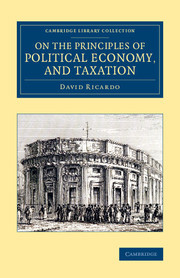Description
On the Principles of Political Economy, and Taxation
Cambridge Library Collection - British and Irish History, 19th Century Series
Author: Ricardo David
This classic work by David Ricardo, originally published in 1817, is one of the founding texts of modern economics.
Language: English
Subject for On the Principles of Political Economy, and Taxation:
Approximative price 53.50 €
In Print (Delivery period: 14 days).
Add to cart
Publication date: 01-2015
Support: Print on demand
Support: Print on demand
Description
/li>Contents
/li>
This work, originally published in 1817, is one of the founding texts of modern economics. Enormously successful as a stockbroker, David Ricardo (1772?1823) was able to lead the life of a wealthy country squire, while his intellectual interests caused him to move in the circles of Thomas Malthus and James Mill. It was at Mill's urging that Ricardo published this book, entered Parliament in 1819 (as an independent member for a rotten Irish borough) and worked for financial and parliamentary reform. Ricardo argues in this work that Adam Smith was mistaken in his understanding of the economic significance of rent, and also demonstrates the mutual benefit of free trade between countries, as against protectionism. The book's findings and conclusions have been controversial since its publication, but led John Stuart Mill to judge Ricardo 'the greatest political economist'.
Preface; 1. On value; 2. On rent; 3. On the rent of mines; 4. On natural and market price; 5. On wages; 5*. On profits; 6. On foreign trade; 7. On taxes; 8. Taxes on raw produce; 8*. Taxes on rent; 9. Tithes; 10. Land-tax; 11. Taxes on gold; 12. Taxes on houses; 13. Taxes on profits; 14. Taxes on wages; 15. Taxes on other commodities than raw produce; 16. Poor rates; 17. On sudden changes in the channels of trade; 18. Value and riches, their distinct properties; 19. Effects of accumulation on profits and interest; 20. Bounties on exportation, and prohibitions of importation; 21. On bounties on production; 22. Doctrine of Adam Smith concerning the rent of land; 23. On colonial trade; 24. On gross and net revenue; 25. On currency and banks; 26. On the comparative value of gold, corn, and labour, in rich and in poor countries; 27. Taxes paid by the producer; 28. On the influence of demand and supply on prices; 29. Mr Malthus's opinions on rent; Index.
© 2024 LAVOISIER S.A.S.




